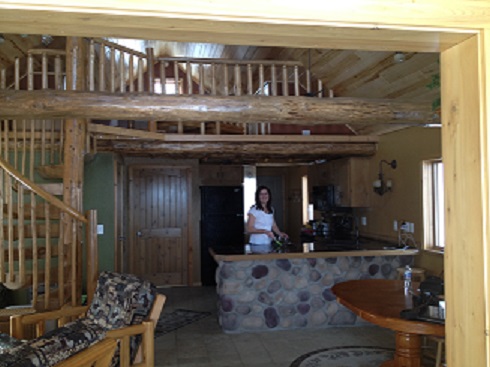I cannot imagine what the women on the plains felt like in a little cabin 100 years ago, but I promise it is a really different experience for me. Last week the high was 30 below and I stayed close to the cabin. It was cozy and fun and I had lots of time to play around with one of my favorite ingredients – sourdough. I had days to work out the kinks in my sourdough and perfect it. I found that it works best when it has lots of time to sit out on the counter and the more often I used it, the more vibrant it became. I am sure the plains women knew everything there was to know about their starter because it was a really precious commodity. There was no way to get more from a neighbor when a blizzard was raging and the miles between farmsteads probably made running over the neighbors to get a “bit” of starter an all-day process. What those pioneer women did have was plenty of time to allow the sourdough to ferment and proof. Here is a simple recipe that yields spectacular results on most days and, when your sourdough has been neglected and is sick, adequate loaves that shortened the hungering time that invariably was a part of the pioneer experience.
100% Whole Wheat Sourdough Bread
Combine the following and let stand covered for 8 to 12 hours or overnight:
2/3 cup starter
1 cup water
1 1/2 cups flour
Add these ingredients to the starter mixture to make final dough:
1 1/2 cups water
5 1/2 to 6 1/2 cups whole wheat flour
1 tablespoon salt
Combine the starter, water and flour until a wet dough is formed. Let stand overnight. Add remaining ingredients and knead by hand or mixer for 5 to 6 minutes or until dough is smooth and elastic. During kneading, add a little more water or more flour to make a soft, pliable dough. Place in a greased bowl. Cover with plastic wrap or a wet tea towel and allow to rise for for 4 to 6 hours at about 80 degrees. Deflate dough by gently pushing down center and pulling sides of dough in. Turn over and cover. Let it sit in a warm place (80°) for 1/2 hour. Turn out on a floured area and fold over 2 to 3 times. Shape into a boule and place in a bowl lined with parchment paper. Cover. Let rise in a warm place (80 degrees) for 1 1/2 hours. If the area is a little cooler, let rise up to twice as long. Preheat oven to 550° with a cast iron dutch oven and lid in oven for about 1 hour. (If your oven does not go up to 550°, just use the highest temperature possible). Place dough in hot cast iron pan and cover with lid. Reduce heat to 450° and bake for 15 minutes. Remove lid from bread and bake for 20 minutes longer or until thermometer inserted in the loaf center reads 195°. Let cool slightly on a rack before slicing.
Makes l large loaf or two small loaves
Tip: Add up to 1 cup of other grains in place of 1 cup of whole wheat flour. Oats, rye, flax, spelt, kamut and buckwheat all make really nice multi-grain loaves. For a lighter loaf, substitute all or part of whole wheat flour with white flour.
Adding 1 tablespoon orange juice when making the dough can help cut the strong flavor of 100% whole wheat loaves and will give a slightly better rise. 100% whole wheat bread will still be a dense, rustic loaf.

